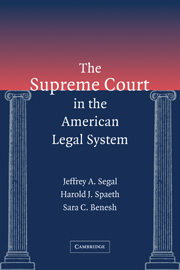Book contents
12 - Supreme Court Decision Making
Published online by Cambridge University Press: 05 June 2012
Summary
It isn't ideology and it isn't politics.
– Justice Stephen Breyer, on the explanation for the Court's decision in Bush v. GoreThe Supreme Court reached one noteworthy and one colossal decision during the 2000 election campaign. First, on December 4, it remanded the Florida Supreme Court decision in Palm Beach County Canvassing Board v. Harris back to the Florida high court. That court, as we noted in Chapter 7, took the contradictory phrases about late returns, “may be ignored” and “shall be ignored,” and melded them to mean “may not be ignored.” In doing so, the Florida Supreme Court relied, as courts often do, on both statutory and constitutional commands.
The problem with this, according to the U.S. Supreme Court, is that Article II of the Constitution requires that each state's presidential electors be appointed “in such Manner as the Legislature thereof may direct.” If the Florida Supreme Court, under the guise of statutory interpretation, replaced the legislature's formula (“may” or “shall” ignore) with an alternative formula (“may not ignore”) from an alternative authority, such as their interpretation of the state's constitution, then arguably an Article II violation occurred. The U.S. Supreme Court's unanimous remand in this case asked the Florida Supreme Court to clarify whether its decision in the Palm Beach County case was based entirely on statutory law as set by the Florida legislature, or whether the court inappropriately incorporated state constitutional law in purported violation of Article II.
In one sense, the Supreme Court's decision in this case was largely moot, for it involved only the Florida secretary of state's ruling in the initial protest period.
- Type
- Chapter
- Information
- The Supreme Court in the American Legal System , pp. 299 - 331Publisher: Cambridge University PressPrint publication year: 2005



